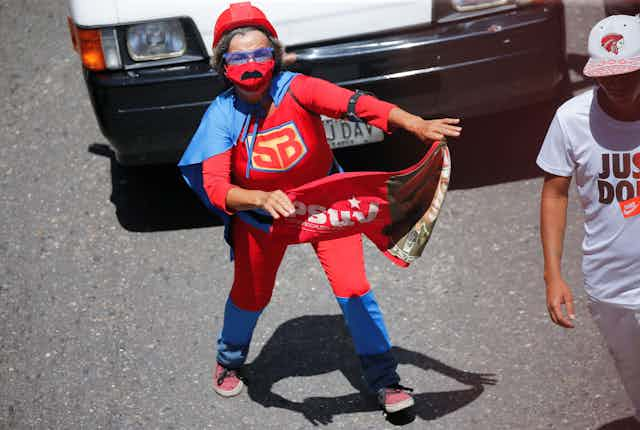“Stupid idiots! Can’t you overthrow him? He’s just a bus driver!” rages a blonde, coiffed character from inside a White House-style building located “somewhere on planet Earth”. The cartoon villain looks like a cross between Donald Trump and The Incredibles antagonist Syndrome. He’s shrieking in Spanish, with a heavy US accent, into a mobile phone.
“We’ve tried everything!” simper the two characters he’s addressing, who look very much like Venezuelan opposition politicians Henry Ramos Allup and Julio Borges. The villain presses a red button that jettisons a drone through the roof of the “White House”. A cartoon map shows the drone heading towards a region that closely resembles the northern coast of South America, before targeting a country shaped very much like Venezuela.
So begins the first episode of the Venezuelan animated cartoon, Súper Bigote (Super Moustache) – starring a heroic character with a moustache like that of the Venezuelan president Nicolás Maduro.
The Venezuelan government is so fond of Súper Bigote that it promotes the cartoon via social media. President Maduro recently encouraged his followers to download Instagram filters to take photographs of themselves as Súper Bigote. And when sharing an episode in which the US attempts to block the entry of COVID-19 vaccines into Venezuela, vice-minister of business Luis Villegas Ramírez tweeted: “It’s great! Don’t miss it!”
Throughout the country, images of Súper Bigote appear to be multiplying. In northern Venezuela, governor Rafael Lacava has controversially renamed a plaza after Súper Bigote and included an image of him on the walls of a remodelled hospital. In the carnival processions this year, a time when children traditionally parade in fancy dress, Súper Bigote was a popular costume, at least according to vice-president Delcy Rodríguez.
While government supporters celebrate the cartoon and their solidarity with an “indestructible” president who is “hero and defender” of the country against threats and difficulties, many others see Súper Bigote as a cynical attempt to create a personality cult. With low popularity ratings, Maduro needs to strengthen his image for the 2024 presidential elections, argues Venezuelan sociologist Trino Márquez.
Read more: The New York Times ends daily political cartoons, but it's not the death of the art form
The cartoon was first broadcast on Venezuela’s state TV channel Venezolana de Televisión (VTV) in December 2021. To date, nine episodes of Súper Bigote have been broadcast on VTV. Each depicts the character using his superpowers to foil dastardly plots devised and financed by the “great villain” to the north, with the aim of sowing chaos and division in a fictional version of Venezuela. It was recently announced that an illustrated comic strip is now planned based on the same character.
Cartoon culture
Latin America has a long tradition of using cartoons, comics and humour to provoke discussion around national and international stories. In Peru, cartoonist Juan Acevedo uses a rodent, El Cuy, to explore social and political issues, including the pandemic; in Argentina, Quino’s Mafalda character challenges middle-class values; and in Chile, Pepo’s cartoon condor Condorito has commented on political events for decades.
When then-Ecuadorian president Lenin Moreno accused Maduro of causing protests in Ecuador in October 2019, the cartoonist joked on state TV:
President Lenin Moreno comes along and says that what’s happening there is my fault. That just by wiggling my moustache I can overthrow governments. I’m already wondering what government I can overthrow next with my moustache. I’m not Superman, I’m Super Moustache!
According to Omar Cruz, who created Súper Bigote: “Venezuelan humour is part of our idiosyncrasy.
At good times and bad, we resort to humour. So much so that it’s humour, and not politics, that can unite the government and the opposition. In round table discussions, humour has always been there because we know that for us, humour is a very serious matter.
In 2004, during the government of Hugo Chávez, Juan Forero wrote in The New York Times that, in a political situation with "more than its share of absurdities and larger-than-life characters”, humour could be used to skewer the powerful and snicker at their perceived failures.
In a political situation with more than its share of absurdities and larger-than-life characters, Súper Bigote, in poking fun at a seemingly indestructible leader and his inept opposition, throws humorous light onto profound and serious tensions.

